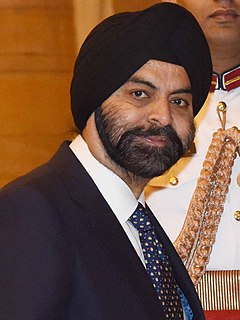A Quote by Dan Schulman
India is among the leaders in thinking about how technology can solve some of the problems about financial inclusion. But if you think that financial inclusion as a problem has a solution rooted in technology, it's obviously not the only thing.
Related Quotes
We don't invest in financial literacy in a meaningful way. We should be teaching elementary school children how to balance a checkbook, how to do basic accounting, why it's important to pay your bills on time. First, education. Begin the learning process as early as possible, in elementary school. Second, encourage and support entrepreneurism. Third, policy. I know it's a priority of the US Treasury to augment financial inclusion and increase financial literacy.
The problem facing humanity today is not a political problem; it's not a financial problem; it's not a military problem. It's obviously a spiritual problem. That is, it has to do with what we believe to be true about who we are, where we are, why we are where we are, and what are we doing on the Earth. What is the purpose of life itself? What we need right now are leaders or models, people who will stand up and not only help to write a cultural story, but help to model it in the way that they interact with each other.
Today when I think about diversity, I actually think about the word 'inclusion.' And I think this is a time of great inclusion. It's not men, it's not women alone. Whether it's geographic, it's approach, it's your style, it's your way of learning, the way you want to contribute, it's your age - it is really broad.
Today when I think about diversity, I actually think about the word “inclusion.” And I think this is a time of great inclusion. It’s not men, it’s not women alone. Whether it’s geographic, it’s approach, it’s your style, it’s your way of learning, the way you want to contribute, it’s your age - it is really broad.
What’s next for technology and design? A lot less thinking about technology for technology’s sake, and a lot more thinking about design. Art humanizes technology and makes it understandable. Design is needed to make sense of information overload. It is why art and design will rise in importance during this century as we try to make sense of all the possibilities that digital technology now affords.

































